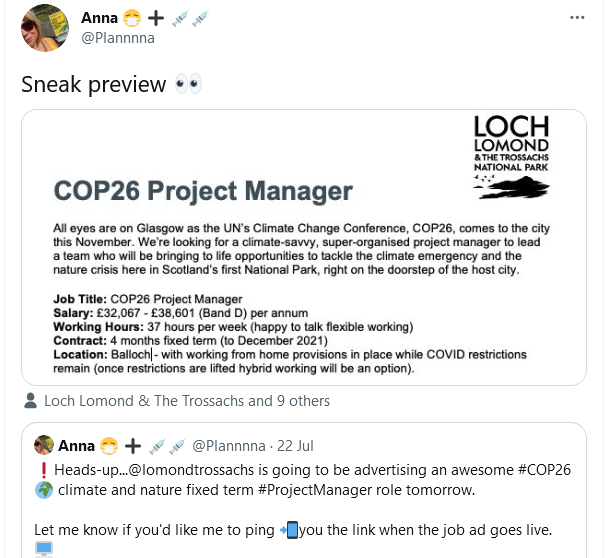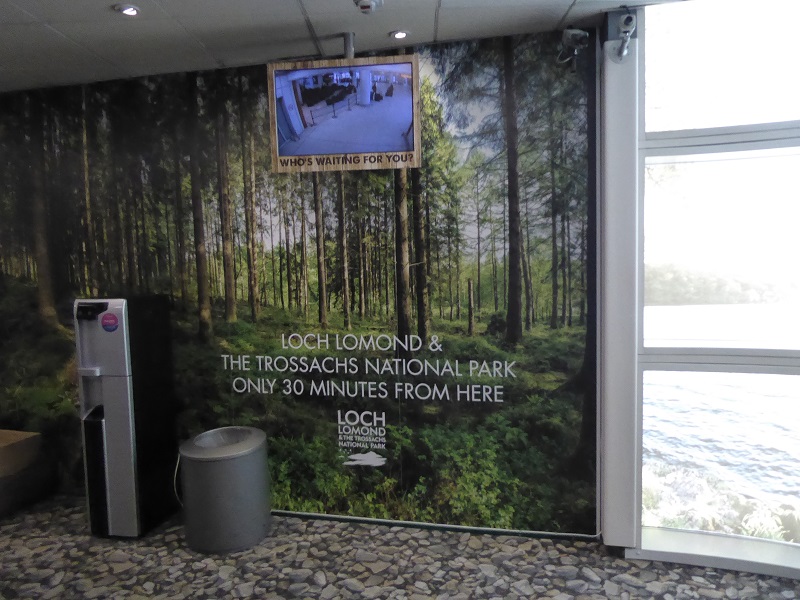 At the June meeting of the Loch Lomond and Trossachs National Park Authority (LLTNPA), Board Member Ronnie Erskine repeated the suggestion he had made in March, that they should prepare to showcase the work they are doing for the Climate Change summit that begins on 31st October. The political need to prepare for the COP conference should have been pretty obvious. Scottish Ministers present at the conference will want to be able to direct delegates to local examples of what the Scottish Government is doing to combat Climate Change and, if the display in Glasgow Airport is still there, thousands of incoming delegates might well ask anyway:
At the June meeting of the Loch Lomond and Trossachs National Park Authority (LLTNPA), Board Member Ronnie Erskine repeated the suggestion he had made in March, that they should prepare to showcase the work they are doing for the Climate Change summit that begins on 31st October. The political need to prepare for the COP conference should have been pretty obvious. Scottish Ministers present at the conference will want to be able to direct delegates to local examples of what the Scottish Government is doing to combat Climate Change and, if the display in Glasgow Airport is still there, thousands of incoming delegates might well ask anyway:

It appears that the LLTNPA belated decided that none of their existing managers were capable of leading the team working on this, hence the need for an “awesome” temporary project manager. They will have 8-10 weeks to prepare, getting to know “relevant partners with any official presence at COP26” and “presenting work to senior stakeholders and ensuring they are kept up to date on the project’s progress throughout“. There is nothing in the Job Description (see here) about understanding what the LLTNPA is actually doing to combat climate change, not that that would take long to find out. The Project Manager then has 4-6 weeks to finish the project. Is this to to draft a report stating what a success the whole project has been?
This money could have been far better spent. Cameron McNeish came close to the truth when he explained (see here) why he had resigned from the SNP at weekend:
“The party has done absolutely zilch on land reform and the environment since Nicola Sturgeon came to power, and I have had a deep frustration over issues like raptor persecution, grouse moors all over Scotland, and what muirburning is doing to the environment.”
The LLTNPA has also done practically zilch for the last ten years when it has come to tackling the major land-use issues which have been feeding the climate and environment crises. For example:
- the overgrazing that has helped turn the National Park into the landslip capital of Scotland (see here);
- the industrial forestry that has wrecked so much of the National Park and driven rural depopulation (see here);
- promoting unsustainable developments such as the Cononish goldmine (see here)while failing to tackle blighted land, such as the former torpedo site at Arrochar (see here);
- the failure to appraise critically the development of run-of-river hydro schemes (see here) many of which are likely to have released more carbon into the atmosphere than they will ever save ;
- the failure to help visitors arrive or get around the National Park by public transport (see here).
The list could go on.
The LLTNPA’s record is such that, apart from a few minor projects, it has very little to showcase to delegates to COP26. What’s more, any delegate who shows an interest in those projects and is in possession of their critical faculties, is likely to quickly see through the greenwash. So why not then take COP26 as an opportunity to ask delegates from across the world what should be done to tackle the way that land is currently being mis-managed in the National Park?
Among those delegates will be those with considerable scientific expertise who could, for example, be asked how they would address the problems of the A83 at the Rest and Be Thankful. As important, are the decision-makers, the people who have experience of how to change planning law, for example, or how to reform subsidies for agriculture and forestry so that these help address the climate and environmental crises. In other words, there will be hundreds of people coming to conference from whom the LLTNPA and the Scottish Government could learn, who could help replace policy spin with action. It would be well worth the LLTNPA employing a Project Manager to seek out that expertise, but not a temporary spin doctor.
What a novel idea – learn from the best of the world’s climate experts, rather than trying to pretend you’re one of them! Taken at face value the job summary would support this aspiration. If LLTNPA came away from COP26 with an innovative programme of initiatives to help tackle the climate emergency and the “nature crisis” then that would be progress. It could be used to challenge the LLTNPA’s frankly quite limited thinking to date, encourage and motivate inclusion across the stakeholders, and allow a more powerful business case for investment to be developed.
Well said Parkwatch again your way a head off LLTNPA. But Scotland is in the dark ages and the people running The LLTNPA are not really interested in change The have really cosy jobs and they want to keep it this way
Well,said all to true of most quasi public bodies personnel interested in self not organisational purpose
Another good post and links well with the previous posts, particularly a land falling apart. Again we have intensive rainstorms tonight falling on land that cannot really cope with it and land in some places that will be dry and compacted increasing the speed of run-off. One example at Rest and be Thankful and another from Storm Desmond in 2015 when the southern part of the Lake District was cut off from the northern part by the direct route for months with a landslide washing away part of the A591. That Christmas I did a few wet walks around the area and saw many new landslides and new drainage gullies, some of them on relatively shallow slopes. This has continued to happen but as far as I am aware it is not being documented. While there has always been erosion our mountains are quite literally falling down at an increasingly fast rate. LLTNPA and other Park Authorities really need to get a grip on this issue quickly and bring in some measures (or lobby Govt for them) that seriously reduce over grazing and incentivise/force land managers to keep the land on the hillside rather than effectively encouraging them to continue with uneconomic sheep and deer grazing flushing already impoverished soil into our rivers. Our hillsides are being gouged away and most places haven’t even got the sticking plaster out yet.
An excellent post, Nick. LLTNPA has reached a new low – even for them – in blatantly trying to con the COP26 delegates with some PR fables. (But of course they have got so much money these days that they have to spent is somehow!). It’s your post, Nick, that should go to all the COP26 delegates – now that really would annoy the LLTNPA Board!